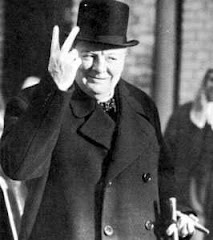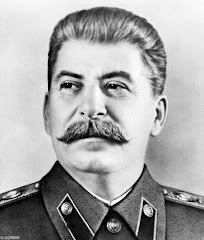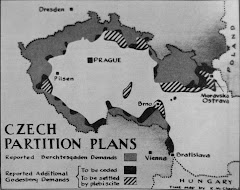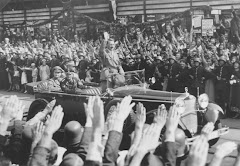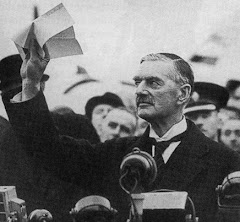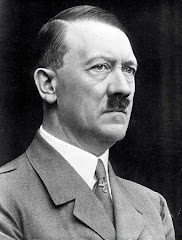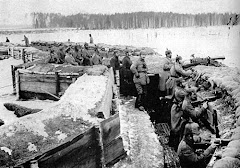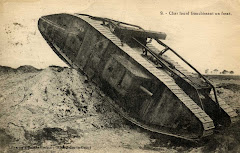Friday, October 25, 2013
Posting #7-The Approach of War
Please respond to the following primary sources dealing with the approach of a second world war. You may take your own approach or answer the questions provided:
President Roosevelt on international anarchy, 1937- "the quarantine speech"
The political situation in the world, which of late has been growing progressively worse, is such as to cause grave concern and anxiety to all peoples and nations who wish to live in peace and amity with their neighbours...Without a declaration of war and without a warning of justification of any kind, civilians, including women and children are being ruthlessly attacked and sunk by submarines without cause or notice. Nations are fomenting and taking sides in civil warfare in nations that have never done them any harm...The peace-loving nations must make a concerted effort in opposition to those violations of treaties, and those ignoring of humane instincts which are today creating a state of international anarchy and instability from which there is no escape through mere isolation or neutrality...There can be no stability or peace either within nations or between nations except under laws and moral standards adhered to by all. International anarchy destroys every foundation for peace. It is my determination to pursue a policy of peace and to adopt every practical measure to avoid involvement in war. We are determined to keep out of war, yet we cannot insure ourselves against the disastrous effects of war and the dangers of involvement... America hates war. America hopes for peace. Therefore, America actively engages in a search for peace.
Identify the main features of Roosevelt’s view in this speech made to the people of Chicago in 1937.
The Hossbach Memorandum, 1937- minutes of a conference held in the German Chancellory, taken by Colonel Hossbach, Berlin, 5 November 1937
The Fuhrer began by stating that the subject of the present conference was of such importance that its discussion would, in other countries, certainly be a matter for a full cabinet meeting...He wished to explain to the gentlemen present his basic ideas concerning the opportunities for the development of our position in the field of foreign affairs...The aim of German policy was to secure and preserve the racial community (Volksmasse) and to enlarge it. It was therefore a question of space...German policy has to reckon with two hate-inspired antagonists, Britain and France, to whom a German Colossus in the centre of Europe was a thorn in the flesh, and both countries were opposed to any further strengthening of Germany’s position either in Europe or overseas...Germany’s problem could only be decided by force and this carried attendant risk...If the Fuhrer was still living it was his unalterable resolve to solve Germany’s problem of space at the latest by 1943-1945...For the improvement of our politico-military position our first objective, in the event of our being embroiled in war, must be to overthrow Czechoslovakia and Austria simultaneously in order to remove the threat to our flank in any possible conflict against the west...Actually the Fuhrer believed that almost certainly Britain and France as well, had tacitly written off the Czechs and were reconciled to the fact that this question would be cleared up in due course by Germany.
What is the German attitude towards the West and the East. In your opinion do they bear any similarity to that of the Kaiser 30 years prior? In your opinion has German foreign policy changed?
Neville Chamberlain defines his attitude towards Czechoslovakia, 20 March 1938- excerpt from Chamberlain’s diary.
You only have to look at the map to see that nothing France or we could do could possibly save Czechoslovakia from being overrun by the Germans, if they wanted to do it. The Austrian frontier is practically open; the great Skoda munitions works are within easy bombing distance of German aerodromes, the railways all pass through German territory, Russia is 100 miles away. Therefore we could not help Czechoslovakia- she would simply be a pretext for going to war with Germany. That we could not think of unless we had reasonable prospect of being able to beat her to her knees in reasonable time, and of that I see no sign. I have therefore abandoned the idea of giving guarantees to Czechoslovakia, of the French in connection with her obligations to that country.
Express the views of Neville Chamberlain in this diary excerpt. Do you agree with the position that he has taken. Try and respond as though you were in 1938 not 2008, as he unlike us, did not have the benefit of retrospect!
The Munich Conference, 1938: an Italian view- excerpts from the diary of Count Galeazzo Ciano, Italian foreign minister, 29-30 September 1938.
29-30 September. In the train the Duce [‘leader’, Mussolini] is in good humour...He criticises British and French policy severely...At Kufstein we meet the Fuhrer. We get into his carriage, where he spreads out on the table all the maps of the Sudetenland and the Western Fortifications. He explains the situation: he intends to liquidate Czechoslovakia as she now is...The Duce listens with concentration. The programme is now fixed: either the conference is successful in a short time or the solution will take place by force of arms. ‘Besides’, adds the Fuhrer, ‘the time will come when we shall have to fight side by side against England and France. All the better while the Duce and I are at the head of our countries, and still young and full of vigour.’ But all that seems superseded by the atmosphere which has been created- an atmosphere of agreement... After a brief stop at the palace where the Duce and I are staying, we go to the Fuhrerhaus [the leader’s house], where the conference will take place. The others have already arrived...The Fuhrer comes halfway down the stairs to meet us and, with the rest of his suite, singles us, the Italians, by a marked distinction of treatment. Brief cold handshakes with Daladier and Chamberlain - then the Duce goes over to a corner of the room where the Nazi leaders surrounded him...We enter the conference room...The Fuhrer speaks - a few words of thanks and then he raises his voice and beats his fist against the palms of his other hand...The Duce affirms the necessity for a rapid and concrete decision, and with this end in view proposed to use as a basis for discussion a document which has in fact been telephoned to us by our embassy the previous evening, as the expression of the desires of the German government...Chamberlain is inclined to linger over legal points. Daladier defends the cause of the Czechs without conviction, the Duce prefers to remain silent and draw conclusions...Daladier particularly is loquacious in personal conversations. He says what is happening today is due solely to the pig-headedness of Benes [the Czech president]...at last, at one in the morning, the document is complete. Everybody is satisfied, even the French, even the Czechs, according to what Daladier tells me.
What insights does Ciano provide regarding the attitudes of Hitler, Mussolini, Camberlain and Daladier towards the Munich agreement?
Hitler’s speech to the generals, August 1939- a speech made prior to Germany’s occupation of Poland.
The decision to atttack Poland was arrived at in the spring...Goering [the head of the Luftwaffe and rearmament program] has demonstrated to us his four-year plan is a failure and that we are at the end of our strength if we do not achieve victory in a coming war...Since the autumn of 1938 and since I realised Japan will not go with us unconditionally and that Mussolini is endangered by that nitwit King and the treacherous scoundrel of a crown prince, I decided to go with Stalin... As to what the weak Western European civilization asserts about me, that is of no account...I experienced those poor worms Daladier and Chamberlain at Munich. They will be too cowardly to attack. They won’t go beyond a blockade...Poland will be depopulated and settled with Germans. My pact with the Poles was merely conceived as a gaining of time. As for the rest, gentlemen, the fate of Russia will be exactly the same as I am now going through with the case of Poland. After Stalin’s death - he is a very sick man - we will break the Soviet Union. Then will begin the dawn of German rule of the Earth...Be hard, we without mercy, act more quickly and brutally than the others. The citizens of Western Europe must tremble with horror. That is the most humane way of conducting a war. For it scares the others off.
What impression of Hitler’s aims during the Second World War can be gained from this speech?
The German invasion of the Soviet Union: the evidence of a German general- statement of Franz Halder, chief of staff, German army (1938-42), military tribunal, Nuremberg, 22 November 1945.
I Franz Halder, being duly sworn, depose and say as follows: That on the first day of April 1938, I took over the supreme command of the German army, the position of first quartermaster general...I, furthermore state and affirm that in March 1941, before the start of the Russian campaign which happened June of that year, Hitler called the chiefs of command of the three parts of the armed forces and also high commanders to a conference in the Armed Forces Chancery...In that conference Hitler said as follows: ‘The war against Russia will be such that it cannot be conducted in a knightly fashion. This struggle is a struggle of ideologies and racial differences and will have to be conducted with unprecedented, unmerciful and unrelenting harshness. All officers had to rid themselves of obsolete ideologies. I know that the necessity of such means of waging war is beyond the comprehension of you generals, but I cannot change my orders and I insist my orders will be executed without contradiction. The commissars [heads of Soviet government departments] are the bearers of those ideologies of Russia and are directly opposed to National Socialism. Therefore they, the commissars, will be liquidated. For the German soldiers who are guilty in this fight of breaking international law, provided that breaking of civil law, such as murder, rape or robbery are not involved, then their breach of international law shall be excused. Russia has not participated in the Hague Convention, therefore has no rights under it’... When this talk given by Hitler was over, listeners on the part of the army were of course outraged by this speech of Hilter’s and some officers turned to Field Marshall von Braushitsch and gave expressions of feelings concerning it. Von Brauchitsch then assured them he was going to fight against this resolution.
What are the strengths and weaknesses of this testimony as a historical resource for explaining the actions of the German army during the campaign against the Soviet Union in 1941?
This posting is now open and will close on Nov 22nd.
The following students will participate in this posting: Taylor D, Carly D, Lexi, Natasha D, Megan B, Chelsey B, Delaney B, Daniel A, Hailey A.
Required reading: pg 129-138 in your text
Posting #6-Adolf Hitler and the Nazi Party
Major Theme: The rise of fascism in Germany
The period from 1924 to 1929 is often as the 'golden age' of the Weimar Republic. German democracy seemed secure, the economy was showing promising signs of recovery, and reparations were no longer causing Franco-German antagonism (deep rooted ill-will). However, trouble was brewing under the surface: the German economic recovery was dependant on U.S loans; and many members of the middle class still harboured deep anger over the economic losses that they had suffered under the 'great inflation'. Another worrying sign for the future stability of the Weimar Republic was the election of Paul von Hindenburg, a hero of Kaiser Wilhelm's army, as president in 1925. Does this sound like a man who is bent on change, on introducing new ideas? Think of the Kaiser and what we said about the political landscape of Europe preWWI in class. What would the presidents view on democracy be?
An even bigger potential danger to Weimar democracy was lurking about in the shadows. His name was Adolf Hitler. His personal views, as mentioned in Mein Kampf (part of today's note), as very important into understanding the origins of WWII. How do the views laid down in Mein Kampf give us an understanding of why Germany went to war? To what extent to you believe the German people might have supported those views?
Hitler was born on April 20th 1889 in Branau-am-Inn, Austria, near the Austrian-German boarder. His father was a customs officer and his mother a traditional housewife. He attended private schools. After the death of his parents he moved to Vienna (1907) where he hoped to become a great artist. After several rejections from notable schools (some run by men who were Jewish) the most important of which was the prestigious Academy of Arts. He was never really down and out like some may have suggested, he was unemployed by choice, living on a large inheritance given to him by his parents. He visited the opera regularly and mostly hung out in expensive cafes, eating chocolate cake, drinking endless cups of coffee, and voicing his opinion to who ever would listen. By 1912 he was earning some money by selling a few drawings and paintings. in 1913 he fled across the boarder into Germany to avoid being conscripted into the Austrian army. When the first world war broke out he was in Munich, the capital of Bavaria, where he volunteered to join the German army. He had found his great two loves, the army and war. He served with distinction, being twice awarded the iron cross for bravery and was promoted to lance corporal.
On the Day that news came of the German defeat, Hitler was in hospital, recovering from a poison gas attack. He was utterly devastated and could not believe it. In July 1919, when he heard of the terms of The Treaty of Versailles, he decided to enter politics. His dream was to build a 'new Germany' under his own leadership, to overturn the Treaty and to establish Germany as a major European power. In 1919 he joined the NSDAP-National Socialist German Workers' Party. By 1920 he emerged as their leader. The early doctrine of the NSDAP called for a revision to the Treaty of Versailles, and aimed to replace democracy with a military dictatorship. To this end, Hitler organized a coup (an event to overthrow the government) designed to take control of Bavaria. The now called "Munich Beer Hall Putsch" of November 1923 as a failure, foiled by the loyalty of the German army and the local police force to the authorities. Hitler was jailed for five years on the charge of high treason yet only served 13 months in the comfortable surroundings of Landsberg prison. At this point his career seemed to be over but he used his time in the jail to write a new strategy for the Nazi party in Mein Kampf (my struggle). This was used as a bible for his followers. The party figured they would seize democratic power then destroy democracy 'from within'. Here are the four major points from this book:
. The destruction of the treaty of Versailles. This would allow Germany to rearm and recover lost territory.
. To gain territory or Lebensraum (livingspace) in Eastern Europe. This would involve a war with the USSR in order to defeat Russian Bolshivism.
. To include all German speaking people in the new 'Third Reich'. The focus would be those in the Sudetenland, Austria and Danzig.
. To create a racially pure German state what would be the most dominant power in Europe.
The two really NEW dimensions of Hitler's policy were a desire to create a racially pure Germany and a virulent obsession with the Jews. However, in all fairness to many Germans, few realized that these new ideas would lead to the extermination of European Jewry. In the beginning the Nazi party was only able to get 2% of the popular vote. From 1929-1933 views changed and they won many more seats, Hitler was on the rise and soon would become Chancellor, eventually declaring himself Fuhrer. It must have taken a very spectacular event to cause German political opinions to change so quickly in just four years. What was it that changed the voter's minds? Please respond to this posting by way of making comments on the article or answering the questions.
This posting is now open and will close Nov 22nd at 11pm.
The following students will participate in this posting: Fernando Q, Cameron P, Hayden P, Dale N, Megan Muxlow, Aly M, Matty M, Cameron L, Adam K, Jenny H
Required Reading: pages 129-138 in your text
Posting #5 Prohibition
Major Theme: The rationale behind prohibition.
Rumblings of Prohibition were heard for decades in Canada and the United States in the 1800s. Early attempts to “dry out” both countries failed, but by the time World War One erupted in 1914, citizens took a different view of prohibition. Temperance groups, farmers, churches and women armed with new-found voting rights rallied together to fight for a ban on alcohol. Their campaigns, protests, parades and lobbying, plus the call to close “all distilleries and breweries as a non-essential industry for the war effort”, noted Art Jahns in WalkervilleTimes.com, led to bans on the importation, manufacture and transportation of liquor. The Canadian and provincial governments (except Quebec) enacted the new policies in 1918. The Volstead Act of 1919 in the United States enacted similar laws. The general public agreed.
Canadian law was reversed soon after, with a repeal of the wartime measures act in 1919. Distilleries and breweries reopened; Canadians were free to manufacture and sell liquor across the provinces and to countries without prohibition in force. As for America prohibition would not be repealed until 1933.
Was prohibition difficult to enforce?
What effects did lobbyist groups like the WCTU have on implementing Prohibition? What were the names of the other groups advocating for prohibition in Canada? What were their reasons for supporting such initiatives?
Do you feel that prohibition was a worthwhile initiative? Would you support such a law in today’s society? Are there currently countries in the world with prohibition style laws? What about the use of marijuana, do you think that it should be legalized?
This blog posting is now open and will close Nov 14th at 11pm
The following students are to participate in this posting: Brittany M, Thomas S, Cameron W, Shayna W, Glen V, Uel S, Kate S, Luke R.
Required reading pages 87-89 in your text
Wednesday, October 9, 2013
WWI Review
WWI- Review
Famous People:
Clifford Sifton Laurier Borden
Sam Hughes Sir Arthur Currie David Lloyd George
Georges Clemenceau Woodrow Wilson Czar Nicholas II
King George V Kaiser Wilhelm II Franz Joseph I
Archduke Franz Ferdinand Gavrillo Princip Otto von Bismarck
Sir Douglas Haig Billy Bishop Roy Brown
Manfred von Richthofen Rasputin
Terms to Know:
Mustard Gas Chlorine Gas Tank
Plane Machine Gun Ross Rifle
Lee Enfield Rifle Barbed Wire Over the Top
Maginot Line Alliance System Imperialism
Militarism Nationalism U-Boat
Dreadnought Destroyer Depth Charge
Trench Trench Foot Artillery
Shell Shock Lice Trench Fever
Black Hand Empire Bolshevik
Communism Romanov Blockade
Rats C.E.F B.E.F
War Measures Act
Countries and Regions to be Familiar With:
Germany Austro-Hungary Serbia
Great Britain France Russia
Italy Czechoslovakia Poland
Polish Corridor Rhineland The Saar
Yugoslavia (Boer War) Naval Race
Alaska Boundary Dispute Alsace/Lorraine Ottoman Empire
Bosnia Herzegovina Lithuania Latvia
Estonia
Some Questions to Consider:
1.) How and why was the Canadian West settled? Who were the parties (people) invovled?
2.) What was the nature of Immigration to Canada in the late 19th century and the early 20th century? Why did people come to Canada and what were some of the obstacles that they had to overcome?
3.) Who was the largest Empire in the World in 1900? How did this empire influence the world and how did this affect Canadian life?
4.) What was life for the average person like in 1900?
5.) What were the long standing issues that plagued Europeans up to 1914? What were the four causes for war in 1914?
6.) What was the July Crisis? What exactly happened, who were the people involved and what choices were made?
7.) What is an alliance system? What two alliance systems were formed before 1914 and who were the countries involved? How could an alliance be a cause for war and how could it prevent one? Which alliance system was more successful and why?
8.) What were the reactions of Canadians to the Boer War and WWI? How might involvement in a European war be a “divisive issue” in Canada?
9.) What was the Schlieffen Plan? Was the plan successful, why or why not?
10.) What were the contributions of Canadians during WWI? How was this war significant to Canadians?
11.) What were some of the hardships faced by soldiers in the trenches?
12.) Describe the nature of the different arenas of warfare: land, air, sea.
13.) Why was 1917 such an important year for the war?
14.) Give a complete analysis of the Russian Revolution: people involved, causes, affects. Was this a negative or positive event in history?
15.) Why was conscription considered in Canada? Was it a divisive issue, if so why?
16.) What was Canada’s involvement at the Paris Peace Conference? Why?
17.) What were the terms of the Treaty of Versailles? Could they be a cause for a future war or way to prevent one? What were the major problems faced by the victorious nations at Versailles?
18.) What were the affects of a European War? Think in terms of : geography, politics, military, economy, society.
Famous People:
Clifford Sifton Laurier Borden
Sam Hughes Sir Arthur Currie David Lloyd George
Georges Clemenceau Woodrow Wilson Czar Nicholas II
King George V Kaiser Wilhelm II Franz Joseph I
Archduke Franz Ferdinand Gavrillo Princip Otto von Bismarck
Sir Douglas Haig Billy Bishop Roy Brown
Manfred von Richthofen Rasputin
Terms to Know:
Mustard Gas Chlorine Gas Tank
Plane Machine Gun Ross Rifle
Lee Enfield Rifle Barbed Wire Over the Top
Maginot Line Alliance System Imperialism
Militarism Nationalism U-Boat
Dreadnought Destroyer Depth Charge
Trench Trench Foot Artillery
Shell Shock Lice Trench Fever
Black Hand Empire Bolshevik
Communism Romanov Blockade
Rats C.E.F B.E.F
War Measures Act
Countries and Regions to be Familiar With:
Germany Austro-Hungary Serbia
Great Britain France Russia
Italy Czechoslovakia Poland
Polish Corridor Rhineland The Saar
Yugoslavia (Boer War) Naval Race
Alaska Boundary Dispute Alsace/Lorraine Ottoman Empire
Bosnia Herzegovina Lithuania Latvia
Estonia
Some Questions to Consider:
1.) How and why was the Canadian West settled? Who were the parties (people) invovled?
2.) What was the nature of Immigration to Canada in the late 19th century and the early 20th century? Why did people come to Canada and what were some of the obstacles that they had to overcome?
3.) Who was the largest Empire in the World in 1900? How did this empire influence the world and how did this affect Canadian life?
4.) What was life for the average person like in 1900?
5.) What were the long standing issues that plagued Europeans up to 1914? What were the four causes for war in 1914?
6.) What was the July Crisis? What exactly happened, who were the people involved and what choices were made?
7.) What is an alliance system? What two alliance systems were formed before 1914 and who were the countries involved? How could an alliance be a cause for war and how could it prevent one? Which alliance system was more successful and why?
8.) What were the reactions of Canadians to the Boer War and WWI? How might involvement in a European war be a “divisive issue” in Canada?
9.) What was the Schlieffen Plan? Was the plan successful, why or why not?
10.) What were the contributions of Canadians during WWI? How was this war significant to Canadians?
11.) What were some of the hardships faced by soldiers in the trenches?
12.) Describe the nature of the different arenas of warfare: land, air, sea.
13.) Why was 1917 such an important year for the war?
14.) Give a complete analysis of the Russian Revolution: people involved, causes, affects. Was this a negative or positive event in history?
15.) Why was conscription considered in Canada? Was it a divisive issue, if so why?
16.) What was Canada’s involvement at the Paris Peace Conference? Why?
17.) What were the terms of the Treaty of Versailles? Could they be a cause for a future war or way to prevent one? What were the major problems faced by the victorious nations at Versailles?
18.) What were the affects of a European War? Think in terms of : geography, politics, military, economy, society.
Subscribe to:
Posts (Atom)



